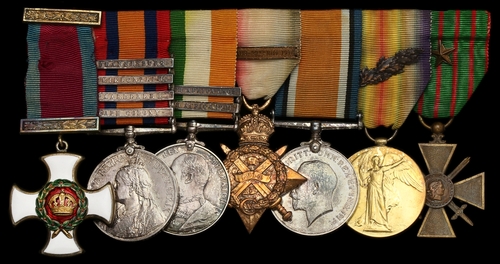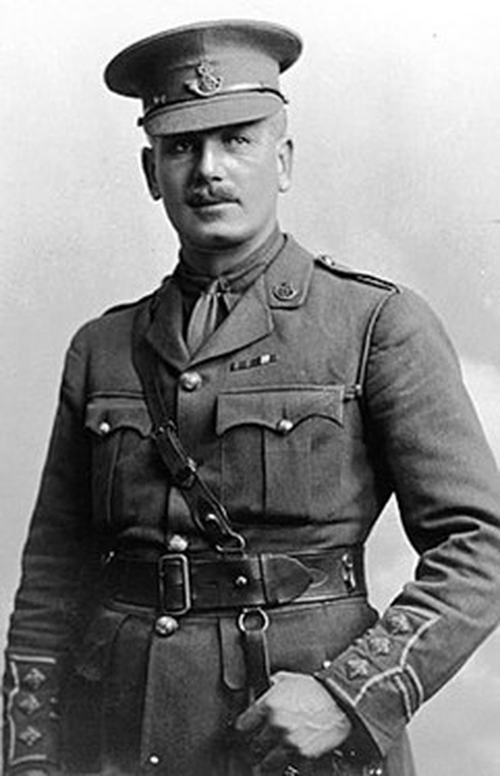Auction: 25002 - Orders, Decorations and Medals
Lot: 127
An outstanding Great War D.S.O. group of seven awarded to Lieutenant-Colonel E. R. M. English, King's Shropshire Light Infantry
His distinguished career as a soldier aside - in which he collected wounds at Paardeberg and in the Ypres salient - the multi-talented English was a county-class cricketer: but his true claim to fame was as a star of the silver screen in the 1920s and 1930s, when he usually played characters 'of some importance' alongside the likes of Stanley Holloway and Roger Livesey
Distinguished Service Order, G.V.R., silver-gilt and enamel; Queen's South Africa 1899-1902, 4 clasps, Cape Colony, Paardeberg, Driefontein, Johannesburg (Lieut. E. R. M. English, Shrops. L.I.); King's South Africa 1901-02, 2 clasps, South Africa 1901, South Africa 1902 (Lieut. E.R.M. English, Shrops. L.I.); 1914 Star, with clasp (Capt. E. R. M. English, Shrops. L.I.); British War and Victory Medals, M.I.D. oak leaves (Lt. Col. E. R. M. English); France, Croix de Guerre 1914-18, mounted as worn, enamel chipped on reverse centre of the first, otherwise very fine or better (7)
Provenance:
Spink, June 1998.
Although engraved in the correct naming style, the Queen's and King's South Africa Medals are in fact official replacements dating from October 1910; the relevant roll entries refer.
D.S.O. London Gazette 3 June 1917.
France, Croix de Guerre London Gazette 21 July 1919.
Ernest Robert Maling English was born in Cheltenham on 2 December 1874 and was educated at Wellington College and the Royal Military College at Sandhurst. Commissioned in the Shropshire Light Infantry as a 2nd Lieutenant in September 1895, he was advanced to Lieutenant on the eve of the outbreak of hostilities in South Africa.
Boer War - wounded
Present in operations in the Orange Free State in February-May 1900, including Paardeberg where he was slightly wounded, English was also present in the actions at Poplar Grove, Driefontein, Houtnek (Thoba Mountain), Vet River (5-6 May) and Zand River. Subsequently during operations in the Transvaal in May-November 1900, he was present in the actions near Johannesburg and Pretoria, and at Elands River (4-6 August). And having then served in the Orange River Colony, including the action at Rhenoster River, he ended the war on operations back in the Transvaal in March-May 1902 (Queen's Medal & 4 clasps; King's Medal & 2 clasps).
English served in India in the 2nd Battalion in 1903-07, in which period he was advanced Captain and soon after returning home was appointed Adjutant in the Territorial Force. It was during this period - in the 1909 season - that he turned out as a right-handed batsman for Gloucestershire. But bat and ball made little contact, his first innings ending in a duck, and his second just 2 runs.
Great War - wounded
By the outbreak of hostilities, English was serving as a Company Commander of 'B' Company in the 1st Battalion, and it was in that capacity that he was embarked for France on 10 September 1914. Having then been briefly engaged in the Battle of the Aisne, the battalion was deployed to trenches near Cassel, where its casualties mounted in the First Battle of Ypres. On 23-24 October 1914, the Shropshires faced an all-out German attack but held their ground, with over 200 German dead being counted in front of their positions. On the 25th however the enemy broke through on the left, leaving English and his 'B' Company 'temporarily in the air … in spite of being heavily enfiladed, 'B' Company held on to nightfall, when orders were received for the battalion to withdraw.' (The Regimental History, refers). In just five days, the battalion had suffered casualties of three officers killed and eight wounded, and its other ranks 52 killed and 71 wounded.
Next deployed to trenches at Rue de Bois, English and his comrades remained based around Armentieres, up to and beyond the so-called Christmas truce. They may not have faced any major infantry actions, but casualties continued to mount as a result of relentless artillery fire. English emerged unscathed until June 1915, when, in positions in the Weiltje salient, north-east of Ypres, he was himself wounded. But he remained on active duty until August 1915, when he was appointed Town Mayor at Hazebrouck.
Advanced to Major, English was next appointed Assistant Provost Marshal in the 7th Division in September 1915, and likewise in 1st Corps in May 1916. Having then returned home in May 1918, he ended the war as Deputy Provost Marshal in London. He was awarded the D.S.O., the French Croix de Guerre and twice mentioned in despatches (London Gazettes 15 June 1916 and 15 May 1917, refer).
Star of the Silver Screen
Placed on the Retired List as a Lieutenant-Colonel in November 1919, English next embarked on an acting career, in which he is described as having been 'a strong supporting star of the 20s and 30s, usually seen as a man of some importance.'
The British Film Institute credits him with over 30 films in the period 1921 to 1939, a career that witnessed him graduate from silent movies to the 'talkies', and one in which he acted alongside many household names.
His first film was 'The Four Feathers' (1921), in which he played Lieutenant Sutch, followed in the same year by an appearance as Dr. Mortimer in 'The Hound of the Baskervilles'. And so the credits rolled on, English's real-life army career making him a perfect match for playing those in positions of authority. His last film was 'Mrs. Pym of Scotland Yard' (1939), in which - aged 65 - he played the Commissioner of Police, opposite the likes of Nigel Patrick.
Actor, cricketer and soldier - and likely a bon viveur - the Colonel died at South Kensington, London in August 1941.
Subject to 20% VAT on Buyer’s Premium. For more information please view Terms and Conditions for Buyers.
Sold for
£1,900
Starting price
£1100







